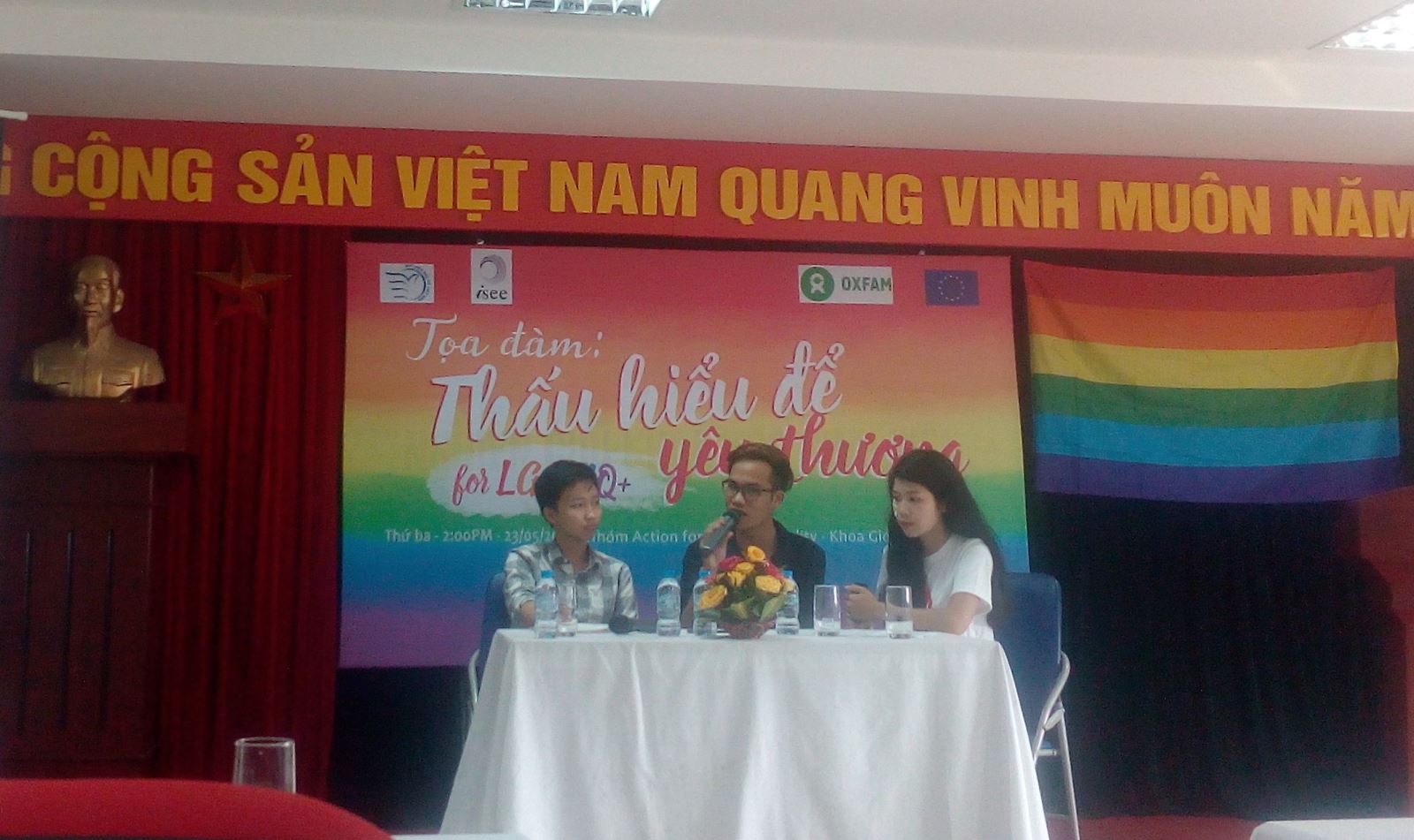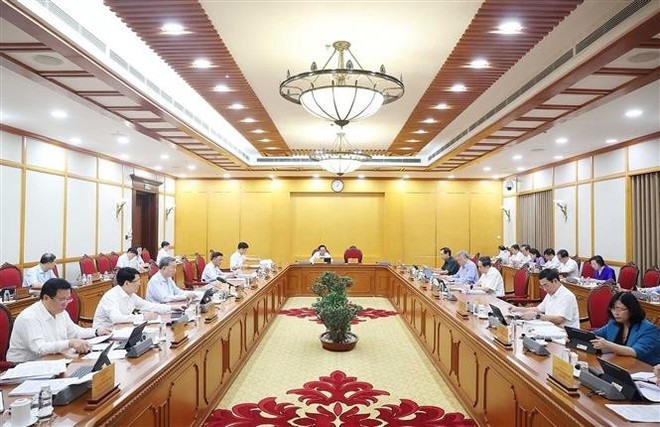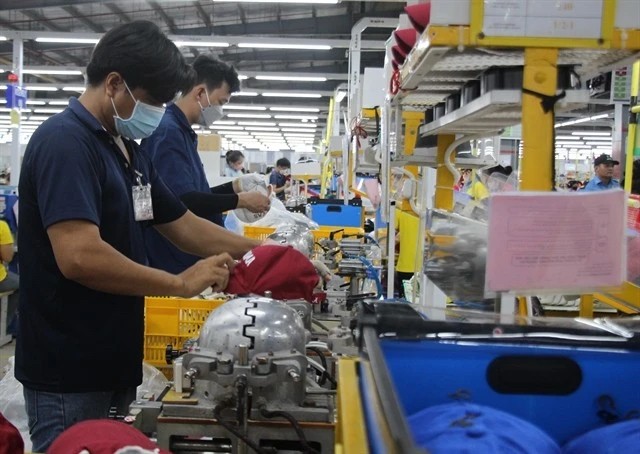Vietnam university seminar: Creating an LGBT-inclusive school climate
(VNF) - Celebrating the International Day against Homophobia, Transphobia and Biphobia (IDAHOT) on May 17th, the Vietnam Women's Academy (VWA) organized a seminar on Lesbian, Gay, Bisexual, and Transgender (LGBT) for students and teachers on May 23rd.
The events, with the support of the Institute for Studies of Society, Economics and Environment (iSEE), the Network of Young Leaders Working for LGBT Rights (NextGen), along with the sponsorship of the European Union (EU) and Oxfam International, aimed to create an opportunity for students and teachers to understand more about LGBT community, reducing discrimination against LGBT people and creating an LGBT-inclusive school climate.
 |
Speaker-Vuong Kha Phong (M) and Nguyen Bao Chau answer students' questions at the event.
The event was attended by Vuong Kha Phong, representative from iSEE and Ngo Bao Chau from NextGen who came to talk to VWA’s students and teachers with the goal of raising their awareness of LGBT people to avoid and fight discrimination in school environment.
The climate of a school has a direct impact on both how well students learn and how well they interact with their peers. Teachers and administrators work hard to make their classrooms welcoming places where each student feels included. But despite these efforts, students who are LGBT continue to face a harsh reality.
In a clip when VMA students answering series of questions about LGBT, most of students didn’t have a good knowledge or idea of sexuality and what it means to be LGBT. The images they see on TV is like, guys dressing up in women’s clothing, that’s what they think being gay and/or transgender are.
Some still discriminate and do not accept the LGBT community, these tend to be people who are accustomed to the more traditional Vietnamese culture and philosophy.
In recent years, the LGBT community in Vietnam has received increasing acceptance and tolerance from the society. On November 21st, 2013, the National Assembly deputies discussed for the first time same-sex marriage in the 6th Session of the Eighth National Assembly.
On 2016, the Law on Marriage and Family went into effect, which abolished regulations that "prohibit marriage between people of the same sex" in Vietnam, but does not grant legal recognition of those unions. Same-sex unions can now take place without anyone being prosecuted. They attracted heavy fines until three years ago.
This support is crucial but not enough in order to create a tolerant society with adequate understanding of the LGBT community and there remains no legal framework for issues including the pision of a couple's assets in the case of separation or death.
Still, the understanding about LGBT issues is still limited. For many people and families LGBT issues are still a new concept and considered a taboo and a topic best avoided to discuss. Thus, questions such as "Who are LGBT? Why are they homosexual? How many LGBT people are there in Vietnam? Do they have love? How do they build a family? …remain unanswered to the public and especially young generations.
Phong said Vietnamese students lack knowledge about sex and reproductive health, let alone subjects such as homosexuality and transgender.
Studies have shown that creating a supportive environment for LGBT students improves educational outcomes for all students, not just those who may identify as LGBT. And it’s not about politics—it’s about supporting students. Any educator, regardless of his personal beliefs, can be a resource for LGBT students.
It all starts with awareness. Often educators are unsure how to support their LGBT students in a meaningful way. These best practices were compiled to give school leaders the knowledge they need to create a climate in which their most vulnerable students feel safe and valued. Through inclusive policies and nurturing practices, administrators, counselors and teachers have the power to build an educational environment that is truly welcoming to all students.
The country has surprised many for its recent progressive stance and new policies that recognize more rights for LGBT people.
Still homophobia and transphobia are palpable. Students considered it was "harmless" to tease and bully their LGBT classmates. For many young members of the community, discrimination comes from their own parents.
At the seminar, VMA students and teachers agreed that Vietnamese schools, like their academy, need to raise awareness about sexuality and gender identity to fight discrimination; creating supportive spaces to counteract bullying and institutional silence about issues of importance to them.
Schools and university can start with introducing LGBT-related contents into their lessons, they said.The presence of counseling services at school can also help eliminate stigma./.
Minh Phuong
Recommended
 National
National
Vietnam News Today (Jun. 7): Prime Minister works with Estonian firms to accelerate projects in Vietnam
 National
National
Vietnam News Today (Jun. 6): Foreign Investment in Vietnam Surges in Five Months
 National
National
Vietnam News Today (Jun. 5): PM sets off for attendance at UNOC 3 in France, official visits to Estonia, Sweden
 National
National
Vietnam News Today (Jun. 4): Vietnam - Promising Candidate for Southeast Asia’s Next Powerhouse
 National
National
Shangri-La Dialogue 22: Vietnam Highlights Some Issues of Ensuring Stability in a Competitive World
 National
National
Vietnam News Today (Jun. 3): PM Pham Minh Chinh to Attend UN Ocean Conference, Visit Estonia, Sweden
 National
National
Vietnam News Today (Jun. 2): Vietnamese Trade Mission Sounds Out Business Opportunities in United States
 National
National
